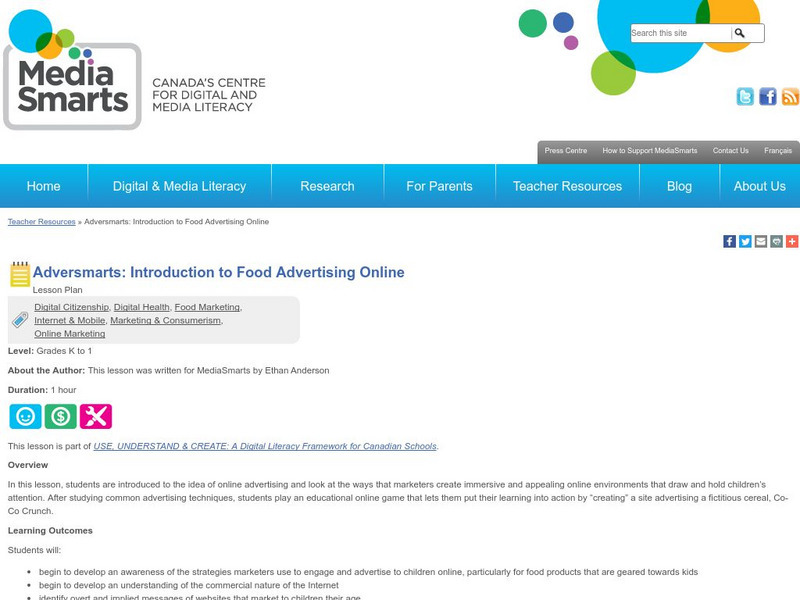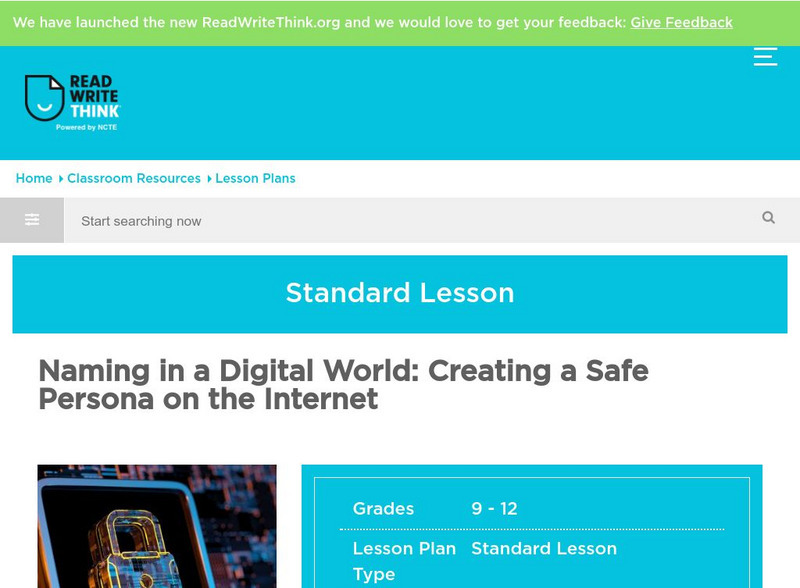Common Sense Media
Common Sense Media: Education: Lesson: Follow the Digital Trail: K 2
Students learn that the information they put online leaves a digital footprint or "trail." This trail can be big or small, helpful or hurtful, depending on how they manage it. Free membership required.
Common Sense Media
Common Sense Media: Education: Lesson: Pause and Think
[Free Registration/Login Required] In this lesson, the Digital Citizens teach students how to be safe, responsible, and respectful online. Includes slideshow, video, lesson plan, song and lyrics, poster, coloring book, and resources for...
Media Smarts
Media Smarts: Adversmarts: Introduction to Food Advertising Online
Media Smarts provides digital and media literacy lessons for learners. For this lesson, young students will learn about online advertisements targeted to children. Learners will play on online game; they will create an advertisement for...
Media Smarts
Media Smarts: Promoting Ethical Behaviour Online: My Virtual Life Lesson
In this instructional activity, students learn about ways to manage their privacy and reputation online by exploring their digital presence and to make good choices about sharing other people's content online. Students explore how they...
Common Sense Media
Common Sense Media: Education: Who's Looking at Your Digital Footprint?
Our digital footprints can have a powerful impact on our future. This can be a scary thought, given that what's in our digital footprint isn't always in our control. Teach students that digital footprints are an opportunity to showcase...
Common Sense Media
Common Sense Media: Connecting With Digital Audiences
Code-switching is the action of changing your language, behavior, or appearance based on who you're with or where you are. In this lesson, students will apply the idea of code-switching to how they use phones and other devices in and...
Science Education Resource Center at Carleton College
Serc: The Digital Divide: A Data Analysis Activity Using Subtotals
A lesson plan that includes a PowerPoint learning module for students. The purpose of the lesson is to teach how to use Excel to analyze a large amount of data, in this case from the US Census. The example being used is the accessibility...
Common Sense Media
Common Sense Media: Education: Lesson: That's Private!
[Free Registration/Login Required] Staying safe online is a lot like staying safe in the real world. By helping a Digital Citizen sign up for a new app, 2nd graders learn about the kinds of information they should keep to themselves when...
Common Sense Media
Common Sense Media: We Are Civil Communicators
When we talk about our personal beliefs and politics, passions can run high -- especially when we're online. These intense moments can often lead to tit-for-tat insults, or worse. But, if addressed calmly and coolly, they can be an...
Other
Learning for Justice: Part of a Community Online
This instructional activity focuses on helping young children learn to participate in different kinds of digital communities. Students will solidify and work on what they know about being part of any community.
Scholastic
Scholastic: Online Safety: It Starts With You [Pdf]
More and more, kids are using the internet for amazing things like research, entertainment, to connect with friends, and more. But without clear guidelines, the digital world can be a tough place to navigate. These lessons are designed...
Common Sense Media
Common Sense Media: Education: The Change You Want to See
Research shows that happiness in life is less about what you do and more about why you do it. When your actions have purpose, they lead to positive results -- both for you and the world. Help students use the power of the internet to...
Common Sense Media
Common Sense Media: Education: Protecting Online Reputations
Tagging friends on social media is a great way to connect with others and capture memorable experiences. But what if they don't want to be tagged? Encourage your students to take responsibility for how they may affect the digital...
Common Sense Media
Common Sense Media: Cyber Smart! Student Curriculum Lesson: Can You Hack It? [Pdf]
Students learn that computers and electronic files are property and explore the reasons for, consequences, and ethics of teen hacking. This ISTE-aligned lesson plan for Grades 6-8 includes student activity and Home Connection sheets....
Common Sense Media
Common Sense Media: Education: Lesson Plan: Powerful Passwords
Students learn the benefits of using passwords and then play a board game to discover some strategies for creating and keeping secure passwords. Requires free membership.
Other
Wosu Public Media: Are You Digi Fit?: Choose to Be Positive With Others Online
This lesson teaches children how to behave appropriately when interacting with others online. They are guided in understanding how their words can be perceived by others online and how to deal with an online bully. Includes links to two...
ReadWriteThink
Read Write Think: Creating a Safe Persona on the Internet
Contains plans for five lessons that explore naming conventions and safety on the internet. In addition to objectives and standards, this instructional plan contains links to sites used in the lessons as well as assessment and reflection...
Alabama Learning Exchange
Alex: Happy Constitution Day
Students work in groups to create presentations answering who, what, when, where, why, and how questions concerning the U.S. Constitution. Presentations will be used to create digital Constitution Day Program.
Common Sense Media
Common Sense Media: Keeping Games Fun and Friendly
Social interaction is part of what makes online gaming so popular and engaging for kids. But online communication can come with some risks. This instructional activity helps students understand how to keep their gaming experiences fun,...
Other
Common Sense Media: Strong Passwords [Pdf]
In this instructional activity, students learn how to create secure passwords in order to protect their private information and accounts online.
Other
Common Sense Media: The Power of Words [Pdf]
Students consider that while they are enjoying their favorite websites they may encounter messages from other kids that can make them feel angry, hurt, sad, or fearful. They explore ways to handle cyberbullying and how to respond in the...
Other
Common Sense Media: Private and Personal Information [Pdf]
For this lesson young scholars learn the difference between private information and personal information, distinguishing what is safe and unsafe to share online.
Other
Common Sense Media: Talking Safely Online [Pdf]
In this lesson students learn that they can develop rewarding online relationships, but that they should never reveal private information to a person they know only online without asking their parent or guardian for permission.
Common Sense Media
Common Sense Media: Education: Build Your Ideal Community: Grades 6 8
Middle schoolers will consider the characteristics of positive online communities that promote responsibility and respect. Requires free membership.






![Scholastic: Online Safety: It Starts With You [Pdf] Lesson Plan Scholastic: Online Safety: It Starts With You [Pdf] Lesson Plan](https://content.lessonplanet.com/knovation/original/366668-12593a759ff779965eed0e2bf599ce31.jpg?1661800493)

